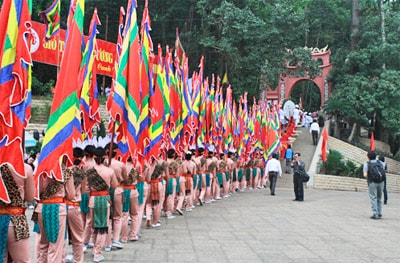“Hung King worship” is a representative intangible cultural heritage of humanity.
UNESCO has officially recognized Vietnam's "Hung King Worship" as an Intangible Cultural Heritage of Humanity.
At the 7th Conference of the Intergovernmental Committee for the Safeguarding of Intangible Cultural Heritage 2003 held in Paris (France), at 2:00 a.m. on December 6 (Vietnam time), UNESCO officially recognized Vietnam's "Hung King Worship" as a Representative Intangible Cultural Heritage of Humanity. Thus, up to this point, "Hung King Worship" is the only heritage of Vietnam honored by UNESCO in the category of beliefs.
According to UNESCO's regulations on representative intangible cultural heritage, heritage dossiers must meet at least 5 criteria, of which the most important criterion is that the heritage has outstanding global value, encouraging the common awareness of all peoples in promoting that value.

Millions of people with one heart, respectfully go to Hung Temple to show gratitude to their ancestors. (Photo: baophutho.vn)
The Vietnamese consider Hung Vuong as the ancestor of the nation. Worshiping Hung Vuong is the traditional morality of "remembering the source of water when drinking" of the Vietnamese people. "The belief in worshiping Hung Vuong" dates back to the time of the Hung Kings, and this is also the origin of the custom of worshipping ancestors of each family and clan of Vietnamese people. For thousands of years, worshiping Hung Vuong, worshiping the ancestors of the nation has become a cultural symbol - belief connecting the past with the present, contributing to fostering feelings for family, village and country...
The dossier "Hung King Worship Belief" clearly states that the value of the heritage is to show respect for ancestors, in the spirit of "remembering the source of water when drinking" and when recognized by UNESCO, the heritage will encourage awareness of communities in many countries around the world about gratitude to ancestors and respect for cultural diversity.
“The worship of Hung Kings” is recognized as an intangible cultural heritage of humanity, which is good news for the people of the whole country in general and Phu Tho province in particular. This is the second consecutive year that Phu Tho province has been honored by UNESCO. In 2011, Phu Tho’s Xoan singing was also recognized by UNESCO as an intangible cultural heritage in need of urgent protection./.
According to (CPV) - LH






